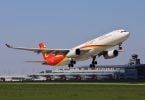British Airways Plc planned to get about 90 percent of its flights off the ground today at London Heathrow airport as the carrier recovers from a second walkout by cabin crew that ended at midnight.
The airline, Europe’s third largest, canceled 31 of 319 flights from Heathrow today, according to its Web site. British Airways scrapped hundreds of trips when flight attendants followed a three-day strike with a four-day stoppage. The carrier faces the threat of more walkouts in April if it can’t resolve pay and staffing differences with 12,000 workers.
The dispute comes as transportation workers in Germany, France and the U.K. gear up for strikes. Deutsche Lufthansa AG pilots may walk out for four days starting April 13 if they don’t reach agreement on conditions. Network Rail Ltd. workers may disrupt U.K. train travel in a strike scheduled for April 6, and drivers at French railway SNCF may walk off the same day.
“We are quickly coming into the high season, so they have to solve this issue before then,” Yan Derocles, a Paris-based analyst at Oddo Securities, said of British Airways. “They don’t have a lot of time to resolve this strike.”
Travel in Britain may be disrupted further if rail- maintenance and signaling workers carry out a planned four-day strike over job cuts and changes to working conditions. The action would affect the journeys of 3.5 million people in the first shutdown of the network since 1994.
Train Disruptions
Network Rail, the state-backed track owner, said it will seek an injunction to prevent the signaling workers from striking, and will continue talking to maintenance employees. The strike ballot was “not valid,” the company said today in a statement.
Societe Nationale des Chemins de Fer, or SNCF, plans strikes in April in the third walkout this year at the French railway. The CGT union, SNCF’s biggest, is asking drivers to call attention to demands on wages and working conditions. Freight workers, ticket-sales staff and other workers may join the strike in following days, Severine Leblond, an administrative assistant at the CGT, said today by phone.
At Lufthansa, second in Europe to Air France-KLM Group, the Vereinigung Cockpit union says it will call on members to walk out from April 13 to April 16 unless the airline agrees to stick to current contracts and stop replacing crews with workers subject to less favorable terms.
Cost of Strikes
Lufthansa grounded hundreds of flights last month and lost about 50 million euros ($67 million) to a planned four-day strike that was called off by a court after the first day.
The seven days of strikes at British Airways probably cost the carrier as much as 75 million pounds ($114 million), according to Andrew Light, a London-based analyst at Citigroup. The estimate doesn’t include potential lost revenue if the strike threat continues, he said.
British Airways, which hasn’t provided a full estimate, says it will log a record 600 million-pound pretax loss for the fiscal year ending today after demand for air travel slumped. The airline flew “well over” 80 percent of customers booked to travel during the strike, it said today in newspaper advertisements.
The carrier has said the first two days of the most recent walkout cost the company 11 million pounds, adding to 21 million pounds it spent to keep planes in the air during the initial three-day strike. The stoppage is the first at the London-based airline since 1997.
Share Performance
British Airways has gained 17 percent in London trading since Feb. 22, when the Unite union said flight attendants had voted to strike, suggesting investors may be dismissing losses and supporting Chief Executive Officer Willie Walsh in his attempt to reduce expenses and improve efficiency. The carrier’s stock fell 0.8 percent to 243 pence today.
Walsh and Unite union leader Tony Woodley have said repeatedly that they’re open to more negotiations.
“We want British Airways now to come back to the table,” Woodley told workers late yesterday at a rally at the Trades Union Congress, which has been acting as an arbiter. “Let’s get our people back to work.”
Woodley and Walsh haven’t met since last-ditch negotiations to avert a strike broke down March 19. British Airways executives are “available for talks,” spokeswoman Cathy West said today.
Waiting to Talk
“We can but hope, we can but wait” for talks to resume, Unite Assistant General Secretary Len McCluskey said yesterday. No negotiations are scheduled under the auspices of the TUC, a spokesman for the group said. The union must give seven days’ notice of a strike.
The union says any settlement must include the restoration of travel perks that Walsh has stripped from striking employees, a move that may make work journeys unviable for 1,500 flight attendants employed in the U.K. but resident abroad. The CEO has withdrawn a previous pay offer, saying any proposal must now be modified to account for the cost of the strike.
British Airways will miss its deadline of today to sign a definitive merger agreement with Iberia Lineas Aereas de Espana SA. The delay was for “technical reasons” and the U.K. carrier expects to sign a deal with Madrid-based Iberia “in due course,” spokeswoman Laura Goodes said today.
The U.K. and Spanish carriers had set a goal of today to sign a deal that would be completed by early November. Goodes declined to specify the reasons for the holdup.
British Airways agreed to merge with Spain’s largest airline in order to build its network to Latin America. British Airways has said since November that it would sign the definitive accord by the end of the first quarter of 2010.
Donating prizes also pays off! Click here to contact our publisher to discuss more.





















